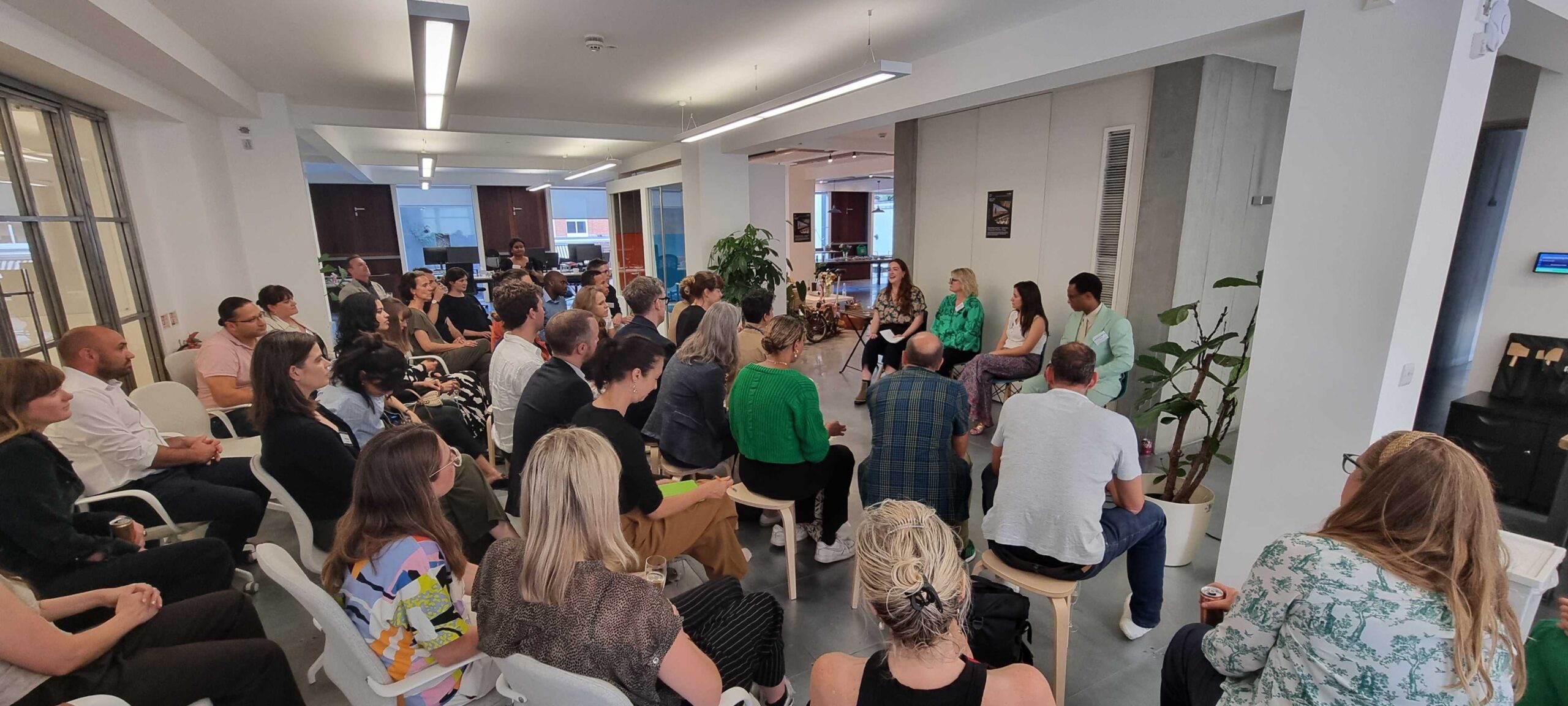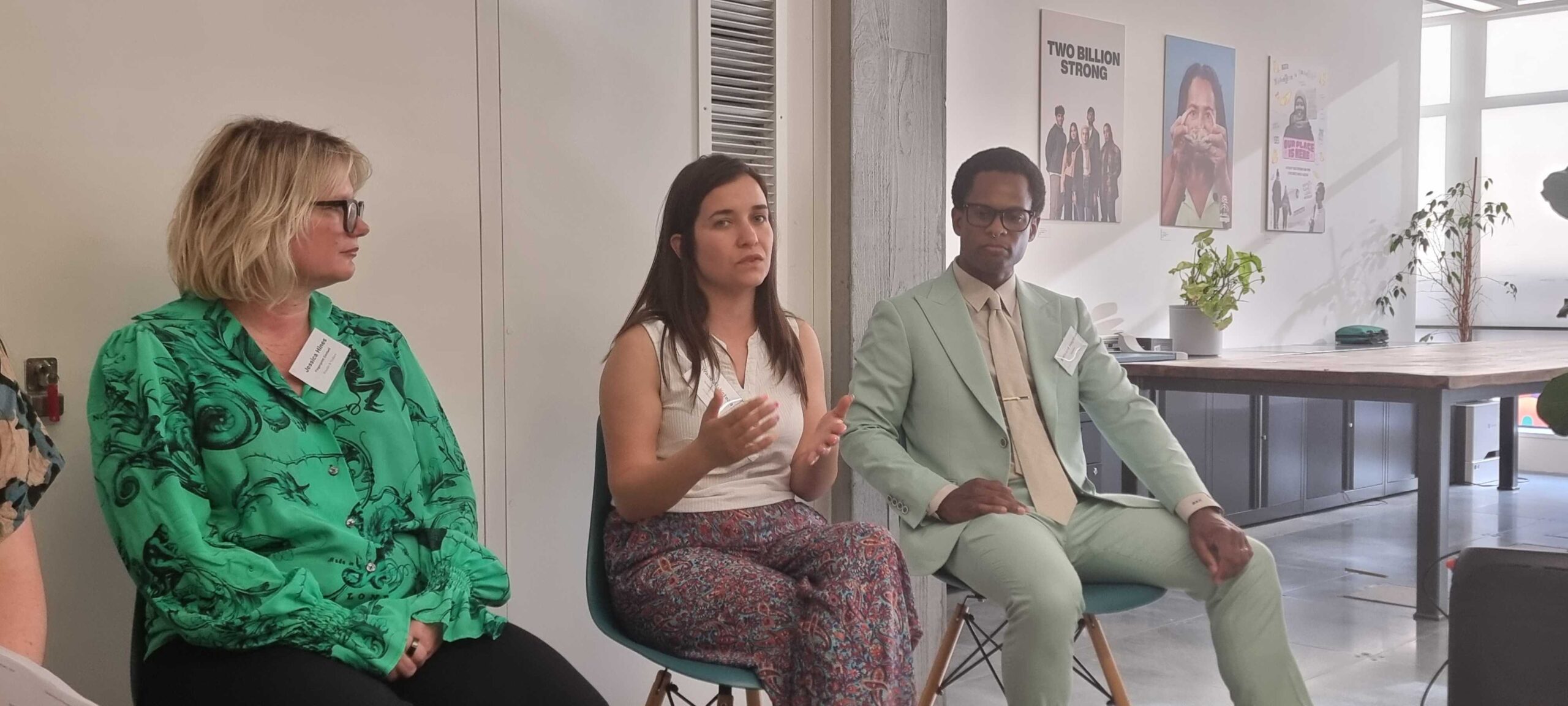What We’ve Learned from Ideas With Purpose
Insights from community-centered storytelling events
Isobel Bruce
Unveiling Key Takeaways on AI, Democracy, Climate, and Impactful Storytelling
In May of this year, we launched a series of live events in our London office, titled ‘Ideas with Purpose’. These events are designed to bring people from different backgrounds and disciplines together around a series of provocative discussion topics.
These closed-door discussions took place on a monthly basis and were hosted and moderated by our very own Corina Kwami, Strategy Director, and Isobel Bruce, Digital Campaign Director. We created a space that encouraged genuine, open interrogations of the things that we are all thinking about, both in our work, and also in how we show up on different issue areas and how to manage the quick progress of technology in society, democracy, and culture.
It’s been a fascinating exploration so far and we look forward to uncovering more insights at our future events, starting again monthly from October. Please get in touch if you have an idea for a topic or would like to attend.
Our key takeaways from ‘Ideas with Purpose’
1. The rapid speed of AI development poses a number of challenges to society.
One critical issue will be the spread of mis and disinformation, which will be heightened in a year with a record number of elections. But it also holds the key to rapid progress in human development if we are able to democratise access to technology and education.
We invited Atoosa Kasirzadeh, Assistant Professor and Research Director at the Centre for Technomoral Futures at the University of Edinburgh, as well as a Research Lead at the Alan Turing Institute, to join our very own Chris Cooper, Head of our APAC office and issue-area expert on misinformation and technology, to discuss potential threats to democracy posed by the release of open AI technologies, such as ChatGPT, Bard and Midjourney.
One critical issue is the pace of progress of technology versus the pace of policy and legislative measures that might meaningfully regulate the impact on people and society. Campaigners and policymakers are always on the back foot and it is clear to platforms that they will rarely face legal measures.
‘This is a global problem,’ explains Kasirzadeh, ‘It’s going to impact our jobs. As a result the economy is going to be disrupted. It’s going to throw up a lot of questions of what it means to be human.’

Another key issue is the sophistication of mis and disinformation, and how quickly it can spread.
‘We tend to think of ourselves as critical thinkers who don’t fall for misinformation,’ says Cooper, ‘But we all do. Being a bit humble about what we know and what we don’t, and having empathy for others will help us to shape our information environments.’
Ultimately, there was a common agreement that digital literacy and critical thinking are at the heart of what we can all do to reap the benefits of this digital revolution, while also combatting the real and present negative impacts on society.
2. Moving the needle on the climate conversation requires active community engagement, empathy and making the story tangible for people, and their daily lives.
Rachel Orr, CEO of Climate Outreach, joined Mariana Ribeiro, Head of the Brazil office and a Senior Campaign Director, across all of the work we have been doing in Brazil and LATAM. With a focus on stories from the frontlines of the climate crisis, Rachel and Mariana spoke about the success they have had by going deeper into communities and highlighting authentic, meaningful stories that people are able to relate to.
One of the issues of campaigning around something like climate is that it can feel unsurmountable, and although ever more present, it can feel like something that is going to happen in a distant future world. We also know that in order to change the course, we need to take action right now.
Both Rachel and Mariana reflected on the challenge of motivating communities around climate when their immediate circumstances are so tenuous, with global challenges relating to housing, food scarcity, employment and poverty. The key is helping people to see how these things are interrelated.
Rachel says, ‘We think we’re the experts- we think we need to communicate by starting to talk but we really need to start by listening, “What do you understand? How does it impact you? How can we have better conversations about this?” And if we want to get out of the bubble we need to go where they are physically. We need to spend time in those communities and in those places’.
Another critical component to solving the complex challenges of climate change communications is collaboration across the sector: ‘We need to practice movement generosity and be very intentional about how we equip the sector. In our work at Purpose, we take our methodologies and tools, and package them up to upskill actors within the sector as a whole. For example, we have partnerships with over 20 organisations in the Amazon, which has vastly increased their ability to improve their strategic communications and campaigns.’
3. Shifting the needle on global issues requires sustained and engaged storytelling efforts, across many channels, and measuring that impact requires thinking beyond the data.
To dig into the fascinating intersection of storytelling and impact measurement, we were fortunate to be joined by a multidisciplinary panel, including Academy-Award nominated film director, Waad Al-Kateab, Producer and Activist, and Co-Founder of Fingerprint Content, Jess Hines, and Global Head of Impact, Measurement, and Learning at Purpose, Bernard Hayman.
Waad’s film, For Sama, is an intimate portrayal of a young family in Aleppo as conflict erupts, and ultimately their decision to flee for the safety of their children. It is unflinching in its gaze on the human impact of individuals caught up in war.
‘I filmed for five years and everything was happening around me. The events were war crimes. Everything we were documenting really mattered. But at the same time I felt so many things about my personal life. And the moment I started to turn my camera inside as well as outside was when I was pregnant’ Waad shared, speaking on the decision to document her personal story and turn it into a documentary feature film.

To drive narrative change, fostering communication, connection, and collaboration is crucial. Jess emphasized the power of collective action: “The other powerhouse is ourselves. It’s the stories we tell each other and ourselves.” Central to her framing were a plethora of metaphors – narratives as an ocean, as layers, as coins in an arcade machine, as quiet quilting – to demonstrate the diversity and adaptability of storytelling.
Finally, Bernard tied the discussion together by acknowledging inherent bias in evaluation methodologies, ‘What are the narratives around evaluation and evidence. You have to acknowledge that. I have my own biases. And it’s not always reflective of the audiences that we want to reach, the communities we want to help, the minds we want to change.’
He continues, ‘Evidence and insights are completely different when you are willing to embed yourself in the context of your audience, and engage impacted groups in all aspects of the process.

